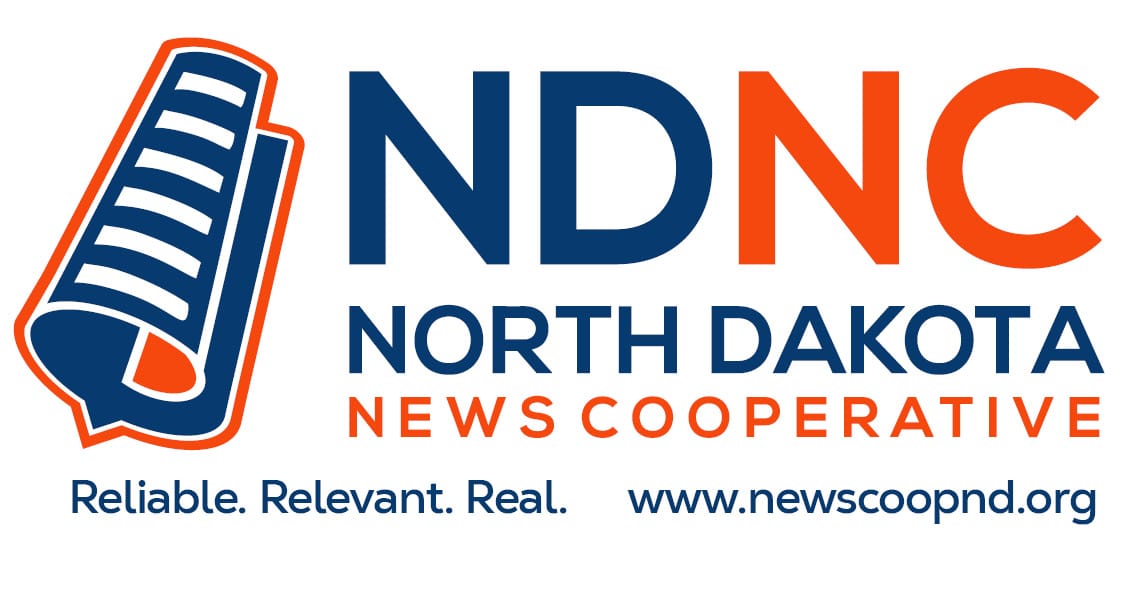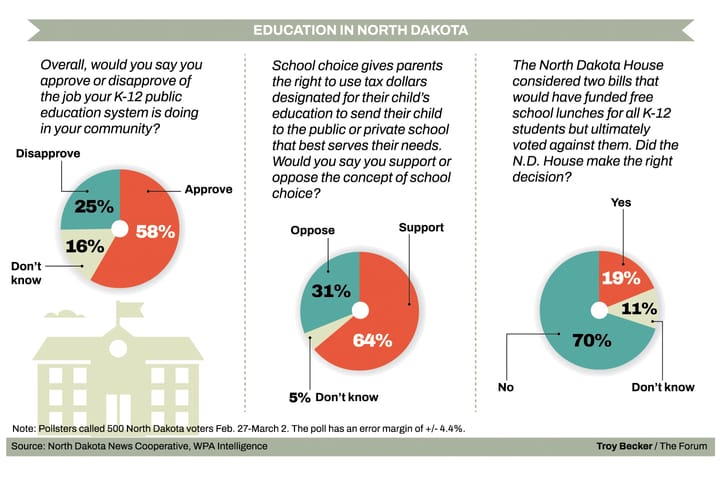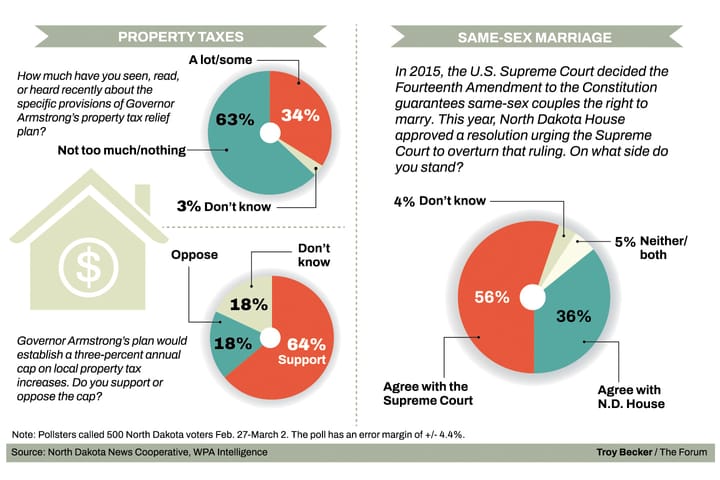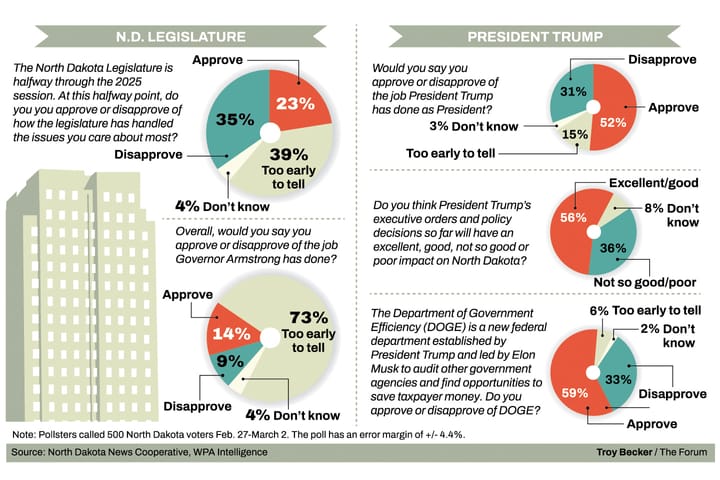North Dakotans split on climate concerns, causes, solutions
Most consensus rallies around energy cost and reliability concerns
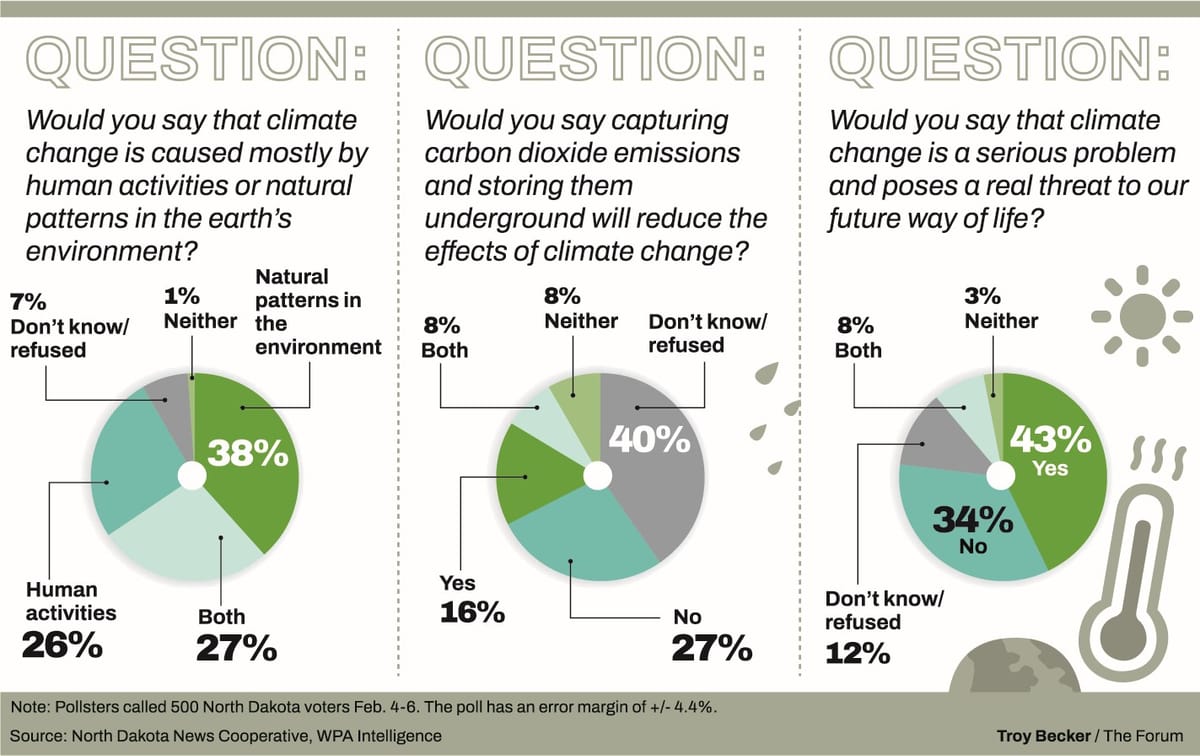
North Dakotans appear split on whether climate change is a serious threat and whether it’s caused by humans or naturally occurring patterns, a new statewide poll from the North Dakota News Cooperative (NDNC) found.
Approximately 43% of eligible North Dakota voters participating in the poll believe climate change poses a threat to their future way of life. A closer look at the numbers shows a stark partisan divide with 87% of Democrats and 45% of Independents saying they are concerned, while only 26% of Republicans say the same.
The North Dakota Poll, conducted by WPA Intelligence in Washington, D.C., took North Dakotans temperature on several key statewide issues related to climate and energy, including their feelings about electric and hybrid vehicles. Results were released Feb. 20.
Most respondents said they harbor real concerns about how changes to energy cost and reliability could impact them personally in the future. A sizable portion of the respondents were on the fence about whether capturing and utilizing carbon dioxide will make a difference in combating climate change.
Meanwhile, the majority were also skeptical of a widespread uptake of electric and hybrid vehicles and the charging infrastructure needed to support a purchase of such vehicles in the state.
Climate concerns, causes
Party affiliation mirrored understanding of many of the topics related to climate change, with Democrats being more concerned than Republicans. Although considering just 42% of all poll respondents identified as Republican, overall numbers related to concern likely were dampened.
“We found that opinions on environmental issues have become highly politicized,” said Trevor Smith, chief research officer at WPA Intelligence.
In terms of what causes climate change, only 26% of respondents believe climate change is mainly caused by human activity, while 38% said those changes were based on natural patterns in the global environment. Another 27% view it as a combination of the two.
Results again followed party line with 66% of Democrat respondents attributing climate change to human activity compared to 10% of Republicans. For those believing natural patterns cause climate change, the numbers flip with 59% of Republicans favoring this theory, while only 4% of Democrats do.
Independent voters remain split on the issue with 34% saying climate change is caused by natural patterns in the environment and 26% saying human activities are the cause.
“Independent voters are the wild card here,” Smith said. “They are not as predictable. And they keep the overall margins closer on these environmental and energy issues.”
One key demographic group, women between the ages of 18-54, regardless of political party preference, say climate change is a serious problem by a 50% to 19% margin.
These divisions also stretch into how people view whether climate change impacts them personally. Democrats are most concerned, with 74% believing they’re personally touched by climate change, while only 20% of Republicans said the same. Independents were split 35% by 35% on whether they were concerned or not about the personal impacts of climate change.
Technological climate solutions
The poll also shows divisions about decisions for mitigating climate impacts locally or on the use of carbon capture technologies as well as electric and hybrid vehicles in the state.
On electric vehicles, 85% of respondents said they probably wouldn’t buy one the next time they purchased a vehicle, with 75% saying it was very unlikely. A total of 75% also said they are not confident enough charging infrastructure will be built in the state to support electric vehicles. For hybrids, the numbers were nearly the same, with 71% unlikely to buy and 60% very unlikely to purchase.
Here there wasn’t much partisan divide. Only 19% of Democrats said they were likely to purchase an electric vehicle as their next car.
“The fact that their consumer behavior doesn’t seem to be affected by their position on climate change shows that they’re not internalizing it, it’s not affecting their behavior,” said Brian Lunde, an opinion research analyst for the North Dakota News Cooperative, which initiated North Dakota Poll.
North Dakota’s Department of Transportation is in the initial stages of rolling out its part of a federal Electric Vehicle Charging Infrastructure program and will receive around $25.9 million in federal funding for this through 2026.
The first phase of North Dakota’s plan focuses on establishing charging infrastructure along the I-94 and I-29 corridors, with chargers at points no more than 50 miles apart.
On capturing carbon dioxide, while 16% believe that capturing and sequestering carbon underground will help reduce the impacts of climate change, 27% disagreed.
A large segment of 40% of eligible voters said they did not know or refused to answer the question, signaling some confusion about the potential use of the technology.
“If that becomes politicized, it’s going to become just like the positions on climate change,” Lunde said of the large group in the middle that appears undecided. “If Trump comes out against it and Biden's for it, then you'll get rapid politicization of the issue.”
Republican views also are at odds with the leadership of Gov. Doug Burgum, at least when it comes to dealing with carbon dioxide emissions. Only 8% of Republican respondents thought capturing carbon dioxide would reduce climate impacts, while 37% of Republicans said it wouldn’t.
During his tenure, Burgum positioned North Dakota as a leader for both sequestering and using captured carbon, either through capturing emissions at coal-fired power plants, or piping carbon dioxide from regional ethanol facilities, and pumping them into deep aquifers beneath the state.
In 2021, Burgum set what his office recently told NDNC was an “aspirational goal, not a mandate” for the state to be carbon neutral by 2030. With no formal plan for reaching the goal, Burgum’s intention is for most of the heavy lifting to come from private sector innovation and investment, supported by public sector research and development.
Despite all the partisan splits, a key area of common ground appears to be concerns related to cost and reliability of energy in the future.
A total of 42% of all eligible voters polled ranked in the highest ranges of concern compared to 10% who have little concern about future energy cost and reliability. On the highest end of the spectrum, 23% said they were extremely concerned about future cost and reliability of energy.
The new North Dakota Poll surveyed 500 eligible and likely voters between February 4-6, 2024 and has a margin of error of +/- 4.4%. North Dakota News Cooperative is a non-profit news organization focused on reporting on topics that impact the lives of North Dakotans and promoting news literacy.
WPA Intelligence is a leading national provider of survey research, predictive analytics, and data management technology to assist in survey design, representative sampling, programming, fielding and data analysis.
The North Dakota News Cooperative is a nonprofit news organization providing reliable and independent reporting on issues and events that impact the lives of North Dakotans. The organization increases the public’s access to quality journalism and advances news literacy across the state. For more information about NDNC or to make a charitable contribution, please visit newscoopnd.org.
